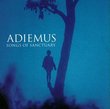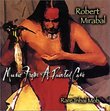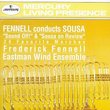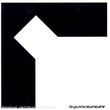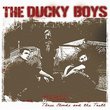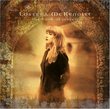| All Artists: Claudio Monteverdi, Emmanuelle Haim, Le Concert d'Astree, Ian Bostridge, Patrizia Ciofi, Alice Coote, Natalie Dessay, Veronique Gens, Sonia Prina / Pascal Bertin, Carolyn Sampson / Christopher Maltman Title: Monteverdi - L'Orfeo / Bostridge, Ciofi, Coote, Dessay, Gens, Prina, Sampson, Agnew, Bertin, Luperi, Maltman, Regazzo, Le Concert d'Astree, Haim Members Wishing: 0 Total Copies: 0 Label: Virgin Classics Release Date: 4/6/2004 Genre: Classical Styles: Opera & Classical Vocal, Chamber Music, Historical Periods, Baroque (c.1600-1750), Classical (c.1770-1830) Number of Discs: 2 SwapaCD Credits: 2 UPCs: 724354564222, 724354564253 |
Search - Claudio Monteverdi, Emmanuelle Haim, Le Concert d'Astree :: Monteverdi - L'Orfeo / Bostridge, Ciofi, Coote, Dessay, Gens, Prina, Sampson, Agnew, Bertin, Luperi, Maltman, Regazzo, Le Concert d'Astree, Haim
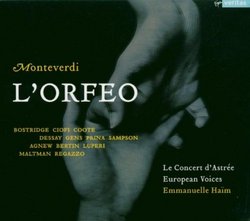 | Claudio Monteverdi, Emmanuelle Haim, Le Concert d'Astree Monteverdi - L'Orfeo / Bostridge, Ciofi, Coote, Dessay, Gens, Prina, Sampson, Agnew, Bertin, Luperi, Maltman, Regazzo, Le Concert d'Astree, Haim Genre: Classical
It seems natural that of all mythological heroes, Orpheus, a singer endowed with matchless musical gifts, should appeal to so many opera composers. L'Orfeo, which premiered at the Court of Mantua in 1607, was Monteverdi's ... more » |
Larger Image |
CD DetailsSynopsis
Amazon.com It seems natural that of all mythological heroes, Orpheus, a singer endowed with matchless musical gifts, should appeal to so many opera composers. L'Orfeo, which premiered at the Court of Mantua in 1607, was Monteverdi's first opera. This fairly new genre sought to combine performing practices of Greek and Roman antiquity with music capable of arousing and expressing emotions through a dramatic text. Alessandro Striggio's libretto gives the story an unusual perspective: it focuses on the power of music, but also on the need for self-discipline. Orpheus, having conquered the forces of death and Hades, is undone by his inability to accept the transience of mortal joy and to control his own impulses. Thus, the opera ends differently from the myth, as well as from the more famous opera by Gluck: Apollo, Orpheus' father, appears and offers him eternal bliss in Heaven. The music is enchantingly beautiful. The vocal lines are cast in the rhetorical "speech-song" used at the time, which carries the dramatic action and expresses the emotions of the characters; however, there is much elaborate coloratura and ornamentation at crucial moments. Instrumental "ritornellos" alternate with the vocal sections in infinitely varied, imaginative combinations, and the wonderfully rich-sounding chorus, impersonating shepherds, friends and furies, adds commentary in chorale-like or contrapuntal settings. The performance is superb. In the prominent part of Orpheus, Ian Bostridge is riveting, changing and coloring his voice to express joy, hope, pleading, passion, anguish, despair; even the intricate coloratura passages add to the emotional impact. Also outstanding are Natalie Dessay, Alice Coote, Mario Luperi and Christopher Maltman. The orchestra is a crucial element, supporting the singers, sometimes with answering and echoing solo lines, setting mood and atmosphere in the instrumental sections; the brass choir passages---solemn, somber, gloriously triumphant---are especially striking. Interestingly, though the strings play without vibrato, the singers mostly use full, vibrant voice. --Edith Eisler Similarly Requested CDs
|
CD ReviewsThe First Great Opera Dr. Christopher Coleman | HONG KONG | 05/08/2004 (4 out of 5 stars) "Claudio Monteverdi's L'Orfeo, composed in 1606, is widely considered the first great opera. As an art form, opera was created not quite 20 years earlier, in an attempt to recapture the musical and dramatic ideas of ancient Greece. Jacopo Peri had apparently initiated that great experiment with his work Euridice. Monteverdi used the same story, one that naturally lent itself to depiction with lots of singing, and created a masterpiece that has endured for four hundred years. The story is from Classical mythology; Orpheus, a gifted singer, is to marry Euridice, but before the nuptials she is killed by a snake. Orpheus descends to Hades to plead with Pluto, God of the Underworld, for her return. Moved by Orpheus's song, his love, and the entries of his own wife, Pluto agrees to allow Euridice to return on one condition. Euridice is to follow Orpheus back to the surface, but he must not look back at her, he must trust Pluto's word. Of course, doubt clouds Orpheus's intentions and when he ultimately turns, Euridice is lost to him forever. The final act provides the obligatory happy ending, in which Apollo appears and takes Orpheus with him to the Heavens. The whole is extremely mannered, there's no attempt at naturalism in this opera. Each act primarily portrays a single emotion--joyous love in the first, despair in the second and fourth, hope in the third and again joy in the final act. Most of the action takes place offstage--in fact, there's very little action at all. The story essentially exists so that Orpheus can sing, and sing he does. There's a fine moment in the first act, in which Orpheus sings about how sad he was before he met Euridice, who has filled his life with joy. Considering the fate soon to befall him, this is an especially ironic bit of text. In the second act, the highlight is the moment when Orpheus is told of Euridice's death, and his haunting lament, Tu se morta; Thou art perished. Monteverdi's makes fine use of word painting that is definitely worth noticing. As Orpheus sings "morte" (death) or that he will go down to Hades "N'andro sicuro a piu profondi abissi" the melodic line descends; as he sings farewell to the skies and sun, ("a dio Cielo, e sole a dio") the line rises. In the third act, I'm amused by Orpheus's song to Charon, the ferryman across the river Styx. Unable to move Charon with the depth of his entreaty, Orpheus eventually suffers the fate that far too many musicians have done--he unexpectedly sings Charon to sleep! But for Orpheus, this unanticipated lullaby is a blessing in disguise, as he takes advantage of Charon's somnolence to ferry himself across the river of the dead. I can't help suspecting that Monteverdi and his librettist shared some amusement at this plot twist.Ian Bostridge, who overall is quite convincing, sings the role of Orpheus. Tu se morta is one of my favorite pieces of music of all time, and I have to admit that Bostridge's interpretation of that particular aria doesn't chill me. Another highlight of the third act is Euridice's lament, when Orpheus has just turned around, resulting in her eternal banishment from the world above. Originally all the women's roles would have been sung by castrati; men who had intentionally had their testicles removed before their voices changed to preserve their high range. Fortunately this practice has been abandoned and the role of Euridice is beautifully sung by Patrizia Ciofi.For a host of reasons, and surely not primarily the lack of castrati, purists will argue about the authenticity of the entire performance; it is an admittedly emotionally expressive one, a touch Romantic in nature at times, with occasional rubatos that seem musically plausible if not historically accurate. It's a matter of some musicological debate, but for most listeners, purely academic. What really counts for most of us is whether the music captivates us. Personally I'm particularly taken not only by the melodic lines and the modal harmonies, but also by the fascinating sounds of the Renaissance instruments. L'Orfeo is the first known work in which instrumentation is specified; and it's a hugely rich variety of sounds, with violins, celli, viols, recorders, lutes, harpsichord, organ, and a very strange looking strummed instrument called a theorbo. There's more-for the act in the underworld Monteverdi employs cornetti (early trumpets, more or less) and sackbuts, precursors to the trombones. The instrumentalists do a fine rendition, although in a few odd moments the bass is uncharacteristically boomy and I'm not entirely convinced by some of the instrumental timbral choices in a few spots. Soloists and choir sing beautifully and although I've commented on the Romantic flexibility of tempo, this should not be misconstrued to mean the vocal approach is Romantic. It is not, there are no wild Verdian vibrati; pleasantly, Bostridge and his colleagues do not consider themselves Pavarotti pretenders.The opera concludes with a dramatically unconvincing Deus ex machina; that convention of early drama in which one or more of the pantheon of Gods would descend from the heavens, lifting the tragic hero out of his despair and raising him skyward. In L'Orfeo's final chorus we are told that obedience to God rewards sorrow with grace. It's not a very compelling message from the modern perspective, but remember this harks from a time where royalty was believed divinely granted, and the composer surely needed to court his patron." The best performance of this opera Michael D. Moore | Atlanta, GA USA | 04/10/2007 (5 out of 5 stars) "I own 3 other audio CD versions and 5 DVD versions of this great, great opera, and can tell you that this CD set is the best of the best. The ornamentation and timing are superb. A nice aside about this recording is that when you import it into iTunes to put onto your iPod (or listen via your computer) the 80 tracks come out sequentially numbered, despite the fact that there are 2 CDs. Having that many tracks (and they are appropriately labeled) makes it easy to jump to your favorite spots. The tempi and inventive percussion use on this recording are other reasons to love it, besides the world-class singing, especially of Bostridge, Dessay, and the magnificent Alice Coote." Everyone But Me.... Giordano Bruno | Wherever I am, I am. | 09/30/2008 (3 out of 5 stars) ".... seems to like this performance, and all for exactly the reasons that i don't like it. One reviewer praises the orchestra for being loud and rambunctious. Exactly! Another praises it essentially for being more dramatic. Exactly! though the word is spelled "melodramatic'.
To my ears, this production has the quality of a "Back to the Future" parody, as if suddenly a number of very fine singers - Ciofi, Dessay, Prina, all favorites of mine - were transported back to the 1950s and asked to sing in the "can bellow" style of the era, with shrieking and wobbling and scooping regarded as art. Likewise, the crew in the orchestra pit were given the assignment of sounding as much like the Boston Pops as possible, a feat made easier by the fact that the cornetto was still regarded as unplayable in 1950. Oh well... one person's lush orchestral timbre is another person's murky excess. Claudio Monteverdi was a composer of infinite variety. He could write the most joyful and celebratory music of his era - in the Vespers of 1610, for instance, and in the Selva Morale e Spirituale - but he could also write refined tragedy without slipping into bathos. L'Orfeo is a work of exquisite sadness, of refined despair. This interpretation by Emmanuelle Haim gets the affect all wrong. The interpretation of L'Orfeo that wins my single vote of acclaim is the DVD by Tragicomedia and Cocerto Palatino, conducted by Stephen Stubbs, stage director Pierre Audi." |

 Track Listings (37) - Disc #1
Track Listings (37) - Disc #1